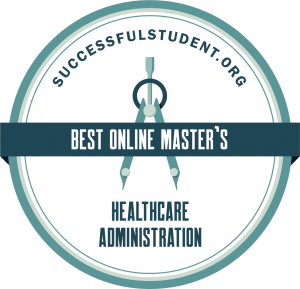We have ranked the best online Master's in Healthcare Administration degrees in the U.S.
An online Master's in Healthcare Administration degree can prepare graduates for a variety of leadership positions in various healthcare environments.
This ranking uses data from the National Center for Education Statistics, and academic influence of the faculty and alumni of these schools in professional publications. This list is designed for online students to make informed college and degree decisions.
The combination of business and healthcare systems coursework helps graduates become leaders in the healthcare field. Healthcare administrators make sure patients receive high-quality services in an efficient way. They deal with the business aspects of healthcare.
Healthcare administrators also ensure a healthcare facility adheres to healthcare industry regulations.
Many colleges and universities offer online students financial aid. Online students as well as traditional students applying for federal financial aid must attend a school which has accreditation from an accrediting agency which received recognition from the Department of Education.
Our Financial Aid Guide for Online College Students provides vital information about the various types of financial assistance such as Federal Direct Subsidized Loans, Federal Direct Unsubsidized Loans, Grants, Lifetime Learning Credit, the American Opportunity Tax Credit, Parent Plus Loans, Grad Plus Loans, and more.
Financial Aid Guide for Online College Students
The Best Online MHA Programs: Master's in Healthcare Administration
Ranking Methodology
This ranking was created using Successful Student's ranking algorithm. This algorithm uses the following data points to calculate a school's ranking placement:
- Retention rate
- Desirability (number of applicants)
- Percentage of students who are fully online
- In-district average tuition for full time graduates
- In-state average graduate tuition
- Academic influence
| Online Graduate College | Ranking Criteria | Weight |
|---|---|
| Retention Rate | 20% |
| Desirability (Number of Applicants) | 20% |
| Graduate Fully Online Enrollment | 10% |
| In-District Average Tuition Full Time Graduates | 10% |
| In-State Average Graduate Tuition | 10% |
| Academic Influence | 30% |
University of North Carolina at Chapel Hill
Gillings School of Global Public Health, Department of Health Policy and Management
Chapel Hill, North Carolina

The Department of Health Policy and Management provides training in management, policy making, and research. The Department prepares students to contribute to improve population health domestically and globally. The Department has students from around the world.
The online Executive Master of Healthcare Administration degree program inspires students to become senior leaders dedicated to improving health. The program covers a variety of challenging subjects and scenarios directly applicable to the field covering ethics, finances, marketing, healthcare policy, and more. The School encourages a global perspective.
Credit requirements: 49 credit hours
Selection of courses:
- Introduction to Financial and Managerial Accounting for Healthcare Organizations
- Healthcare Finance
- Healthcare Policy and Economics of Healthcare Insurance
- Healthcare in the United States: Structure and Policy
- Healthcare Strategy and Marketing
- Health Information and Quality Tools
- Operations Research for Healthcare Systems
The integrated curriculum includes intense on-campus workshops. The on-campus experiences allow students to directly network with professors and peers and attend lectures from leading experts in the field. The program includes three required on-campus sessions per year which run for 14 days each (eight work days and six weekend days).
Online Instruction Style: Synchronous, real-time courses meeting online twice per week; cohort model of 40-50 students with sequential, cumulative courses
Degree time to completion: Two years, students have up to five years to complete all requirements
Start dates: One admissions date per year in the fall
Admissions and transfer credit information: Candidates need a minimum of three years work experience in healthcare or human resources. The online application asks students to submit official transcripts from prior undergraduate studies, a personal statement, current resume, three letters of recommendation, and GRE scores from within the past five years.
Accreditation: The Gillings School of Global Public Health received accreditation from the Council on Education for Public Health (CEPH), and the MHA program has accreditation from the Commission on Accreditation of Health Management Education (CAHME).
The Southern Association of Colleges and Schools Commission on Colleges (SACSCOC) provides the University of North Carolina with accreditation.
Virginia Commonwealth University
College of Health Professions, Department of Health Administration
Richmond, Virginia

The Department of Health Administration has clinical affiliations and close working relationships with numerous health care organizations and agencies in Virginia and throughout the nation.
The Department extensively utilizes the organizations and agencies as clinical facilities in the department's educational programs.
The online Master of Science in Health Administration (MSHA) is an 'industry specific' specialized degree tailored toward working professionals looking to advance their careers.
The curriculum focuses on enhancing business skills within the healthcare field. Courses challenge students to improve leadership skills, develop effective communication strategies, consider ethical questions, and more. The University also offers a Master of Health Administration (MHA) degree.
Credit requirements: 41 semester hours, or 14 courses
Selection of core courses:
- Health Economics
- Healthcare Organization and Leadership
- Health Analytics and Decision Support
- Healthcare Law and Bioethics
- Information Systems for Healthcare Management
- Healthcare Marketing
The online MHA degree requires six one-week, on-campus sessions. During this time students network with peers and professors, participate in seminars, and use the department's learning laboratory.
Online instruction style: Asynchronous
Learning enrollment options: Full-time and part-time
Degree time to completion: 22 months for full-time enrollment
Start dates: Admissions is on a rolling basis
Admissions and transfer credit information: The University gives admission preference to students with five years of professional experience in managerial or supervisory roles. Applicants must have an undergraduate degree in any area.
Candidates must submit a professional resume, personal statement, official transcripts, three letters of recommendation, and GRE or GMAT scores. Students interested in transferring credit should contact the program director.
Accreditation: The online Masters in Healthcare Administration program has accreditation from the Commission on Accreditation of Healthcare Management Education (CAHME). The Southern Association of Colleges and Schools Commission on Colleges (SACSCOC) provides Virginia Commonwealth University with accreditation.
George Washington University
Milken Institute School of Public Health, Department of Health Policy and Management
Washington, District of Columbia

The Department of Health Policy and Management's faculty, staff and students engage in health policy and health management scholarship, applied policy analysis and evaluation, and health services research.
The Department has a large number of grants and contracts, with a special focus on healthcare and public health system transformation. The Department of Health Policy and Management serves as a resource for shaping and advancing health policy and management options.
The Department leverages its location in Washington, DC, which provides opportunities for collaborations with health systems, policy leaders, public health practitioners, and healthcare executives. The Department includes the Center for Health Policy Research and the Center for Health Workforce Research.
The Master of Health Administration online degree program integrates business and medical informatics training, management theory, knowledge of healthcare systems, ethics, law, and policy, and more.
The curriculum focuses on quality and performance improvement, leadership and strategic management trends, community health planning, leadership skills, and advocacy, finance, organizational theory, and health law.
The curriculum includes eight 10-week learning modules which has four separate cohorts. Every learning module focuses on specific core skill sets for optimal delivery of healthcare. The faculty-designed coursework provides students the skills and knowledge to improve the function and efficiency of healthcare organizations.
The modules include:
- Healthcare Management and Strategy
- Medical Informatics and Decision Management
- Healthcare Financial Management
- Community and Public Health
- Health Economics and Quantitative Methods
- Quality and Performance Improvement
- Law and Policy
- Systems Thinking and Learning
Credit requirements: 50 credits
Selection of core courses:
- Introduction to the US Health Services Delivery
- Quantitative Methods & Epidemiology in Health Services
- Health Services Information Applications
- Medical Informatics
- Health Services Finance
- Health Services Financial Applications
- Health Economics
- Health Law for Managers
- Environmental & Occupational Health in a Sustainable World
Students participate in two 40-hour immersions and two 20-hour immersions at the George Washington University campus and at various health organizations. Students in the program have access to the Student and Alumni Career Advising group, which provides students a range of services and resources.
Online instruction style: Students in the program must attend weekly, live online classes
Degree time to completion: Students can complete the program in two years and take up to four years
Admissions and transfer credit information: Applicants must have, at minimum, a bachelor's degree from a regionally accredited U.S. institution of higher learning or an international institution which has accreditation from the country's ministry of education or comparable governmental agency.
Applicants must have at minimum, two years of full-time health sector experience or three years full-time experience in any other industry and currently employed in the healthcare field.
Applicants must submit official transcripts from all prior undergraduate, graduate and professional study and also a minimum of two letters of recommendation from academic or professional contacts. MHA students must have earned a B or better in Financial Accounting and Introduction to Statistics.
Applicants do not need to provide GRE or GMAT or other standardized test scores. Students can transfer a maximum of 12 credits taken at a graduate level with a grade of B or better.
Students must have completed the courses in the last three years and the courses must not have counted toward any other degree program.
Accreditation: The residential Master of Health Administration (MHA) program has full accreditation from the Commission on Accreditation of Healthcare Management Education (CAHME). The Middle State Commission on Higher Education (MSCHE) provides George Washington University with accreditation.
Pennsylvania State University-World Campus
University Park, Pennsylvania

Penn State World Campus, the online division of the Pennsylvania State University, offers over 150 graduate and undergraduate degrees, certificates, and non-credit courses.
The online Master of Health Administration in Health Policy and Administration degree program is a collaboration between Penn State World Campus and the Penn State Department of Health Policy and Administration in the College of Health and Human Development.
Designed for experienced, mid-level professionals, the online program emphasizes critical thinking, effective communication, and ethical leadership throughout the curriculum. Students combine relevant work experience with a business management curriculum in order to enhance their qualifications in the healthcare environment.
Areas of study include:
- Health care marketing
- Health law
- Financing health care
- Quality improvement in health care
- Health economics
- Information systems in health services administration
The program includes new technology and cutting-edge organizational and management skills.
Credit requirements: 49 credits, or 17 courses
Selection of core courses:
- Financing Health Care
- Introduction to Health Services Organizations and Delivery
- Leadership Ethics in Health Services Organizations
- Health Services Organizational Behavior
- Financial Management in Health Institutions
- Managing Health Care Operations
- Change Leadership in Health Services Organizations
- Population Health and Quality Management in Health Services Organizations
The program requires two on-campus intensives; one in the first semester and one in the last semester. The school provides room and board, however, students are responsible for their own transportation. Penn State World Campus expects students to complete a one-credit independent study program in the fourth semester. Courses typically run for 12 to 15 weeks.
Online instruction style: The majority of courses provide an asynchronous learning style, with set dates for the completion of projects and exams.
Degree time to completion: 28 months or seven continuous semesters
Start dates: fall start date only
Admissions and transfer credit information: Candidates must complete an online application. Candidates must have an undergraduate degree and a minimum of five years of professional work experience.
Additionally, candidates must submit official transcripts, two letters of reference, a resume, and personal statements. Standardized test scores are not required for admission.
Students can transfer up to 10 graduate credits from an external accredited institution or 15 graduate credits from coursework completed at Penn State University.
Accreditation: The Commission on Accreditation of Healthcare Management Education provides accreditation. Penn State World Campus has accreditation from the Middle State Commission on Higher Education.
University of Southern California
Sol Price School of Public Policy
Los Angeles, California

The Sol Price School of Public Policy has a mission to improve the quality of life for people and their communities in the United States and abroad. The School includes notable MHA faculty members.
The online Executive Master of Health Administration degree caters to working professionals with prior experience in the field. The online MHA curriculum provides leadership and organizational skills.
The curriculum focuses on five important areas:
- Innovative leadership skills in changing times
- Efficient management and administration skills
- Creating and improving patient safety and care quality
- Effective organization of health information through the use of technology
- Providing cost-effective care
Credit requirements: 36 units
Required courses:
- Information Technology and Patient Engagement
- Leading People and Health Care Organizations
- Health Economics, Financing, and Reimbursement
- Managing the Organization's Financial Health
- Strategic Management
- Managing and Improving Health
- Managing Risk
- Operations Management for Accountability
- Operational Efficiency Processes in Heath Care Organizations
- Developing and Monitoring of Quality and Patient Safety Outcomes
- Health Information Systems
- Quality of Care Concepts
- Frontline Issues in Health Services Administration and Policy
Students must participate in two five-day on-campus experiences for direct networking and intense educational sessions.
Online instruction style: Both synchronous and asynchronous
Degree time to completion: Six semesters
Start dates: spring, summer, and fall start dates
Admissions and transfer credit information: The admission application requires students have an undergraduate degree with GPA of 3.0 or greater.
Candidates must provide official transcripts, three letters of recommendation, a professional resume, and statement of purpose. Candidates must have a minimum of five years professional experience.
The department allows up to eight units of transfer credit for a 33-40 credit degree. The credit must be no older than seven years.
Accreditation: The MHA program has accreditation from the Commission on Accreditation of Healthcare Management Education. The University of Southern California has accreditation from the Western Association of Schools and Colleges (WASC).
University of Central Florida
College of Health and Public Affairs, Department of Health Management and Informatics, UCF Online
Orlando, Florida

The Department of Health Management and Informatics provides innovative academic programs in health management and has a distinguished faculty which encourages service-learning and student research. The Online Executive Master of Health Administration degree program caters to full-time working professionals seeking to advance their career.
The curriculum emphasizes the structure of healthcare organizations and the impact of relevant issues on the industry.
The degree prepares graduates for a variety of leadership careers such as Business Development Director, Executive Director, Practice Manager, Risk Management Director, Chief Nursing Officer and more.
Students can complete the Master's in Health Administration degree completely online, however the University offers certain prerequisite classes and elective options only on-campus.
Credit requirements: 44 credit hours
Core courses:
- Health Care Statistics and Research
- Leadership for Health Care Executives
- Financial Accounting for Health Care Managers
- Health Care Organizational Behavior and Human Resource Management
- Health Care Quality and Risk Management
- Financial Management for Health Care Managers
- Health Care Informatics for Health Care Leaders
- Health Care Economics and Policy
- Epidemiology and Health Planning
- Health Care Ethics and Law
Before graduation, all students must pass a cumulative capstone course.
Online instruction style: Students must take classes in sequence. Students move through courses with a cohort of up to 30 peers.
Learning enrollment options: Full-time only (two courses per semester)
Degree time to completion: Two academic years, including one summer session
Start dates: spring and fall
Admissions and transfer credit information: Candidates must submit past official transcripts, a current resume, three letters of recommendation, and a one to two-page personal statement.
The University expects candidates to have a least three years of relevant professional experience before applying. Students must submit the appropriate official transcripts prior to admission to have graduate transfer credit considered.
Accreditation: The Executive Master of Health Administration program has accreditation from the Commission on Accreditation of Healthcare Management Education. The Southern Association of Colleges and Schools Commission on Colleges.
University of Scranton
J.A. Panuska College of Professional Studies
Scranton, Pennsylvania

The J. A. Panuska College of Professional Studies prepares students for a wide variety of professions. The College enhances the student experience with both theoretical studies and practical hands-on experience.
The Master in Healthcare Administration online degree emphasizes healthcare leadership competencies in areas such as law, ethics, quality control, financial management, organization, and more.
Students in the program develop leadership skills. The online Master's degree in Healthcare Administration prepares students for advanced administrative positions in settings such as consulting firms, hospitals, health insurance organizations, and long-term care facilities.
Credit requirements: 47 credits total (including internship)
Selection of core courses:
- Healthcare Law
- Human Resources Management
- Healthcare Economics and Policy
- Leadership in Health Administration
- Administrative Issues
- Healthcare Planning and Marketing
- Healthcare Financial Management
- Healthcare Operations and Quality
- Healthcare IT Management
- Healthcare Ethics
Students must complete a 150-hour, three-credit internship for field experience.
Online instruction style: Synchronous and asynchronous
Learning enrollment options: Students can take the Healthcare Administration degree online full-time or part-time
Degree time to completion: On average, students complete the online MHA program in 30 months. Students have up to six years to complete all requirements.
Start dates: Six start dates throughout the year
Admissions and transfer credit information: The online application requires students to submit a professional resume, statement of intent, and three letters of reference. Students must have three years working experience to apply.
The University accepts up to nine graduate credits from an accredited institution at the time of admission.
The University only accepts credits applicable to the program with a final grade of B or higher (pass or satisfactory status is not accepted). Credit must be within the past six years.
Accreditation: Both the online and on-campus Master of Health Administration programs have accreditation from the Commission on Accreditation of Healthcare Management Education. The University of Scranton received accreditation from the Middle States Commission on Higher Education.
University of Missouri-Columbia
School of Medicine, Department of Health Management and Informatics, Mizzou Online
Columbia, Missouri

The educational leadership of the Department of Health Management and Informatics at the University of Missouri has national recognition.
In 2018 the Department received the Cerner Award for Excellence in Healthcare Management Systems Education at a Commission on Accreditation of Healthcare Management Education (CAHME) event.
It's also the fourth-largest program in the nation to hold the CAHME accreditation. The online Master's in Health Administration degree helps graduates integrate clinical and managerial competencies.
The curriculum material covers a wide array of relevant topics including financial management, health informatics, healthcare law, leadership, human resources, and strategic planning.
Students practice integrating clinical and managerial competencies throughout their coursework.
Credit requirements: 42 credits
Selection of core courses:
- Introduction to the US Health Care System
- Administration of Health Care Organizations
- Methods of Health Services Research
- Managing Human Resources in Health Care Organizations
- Decision Making for Health Care Organizations
- Financial Management for Health Care Organizations
- Decision Support in Health Care Systems
- Health Policy and Politics
The program has a total of four on-campus weekend visits required in the spring and fall semesters. Before graduation students must pass an oral exam and present an independent research project.
Online instruction style: Cohort model with courses taken in a set order
Degree time to completion: Average two years
Start dates: Rolling admission with matriculation in the spring only
Admissions and transfer credit information: Candidates for the Master's in Health Administration online program must have an undergraduate degree from an accredited institution and a minimum of three years relevant work experience. The application requires official transcripts, resume, a personal essay, three letters of recommendation, and statement of purpose.
Standardized test scores are not required. Students can transfer up to 20 percent of the required graduate credit hours into the program from an external accredited institution. The University only accepts credits from within the past eight years.
Accreditation: The program has accreditation from the Commission on Accreditation of Healthcare Management Education. The Higher Learning Commission provides the University of Missouri with accreditation.
Seton Hall University
School of Health and Medical Sciences
South Orange, New Jersey

The School of Health and Medical Sciences combines the resources of affiliate healthcare sites with the expertise of Seton Hall University to provide academic and clinical training in graduate-level health sciences and health administration.
The School's emphasis on professional education prepares healthcare leaders to focus on patient-centered care and to make a difference in patients' lives and their communities.
The School of Health and Medical Sciences offers the Master of Healthcare Administration degree both on-campus and online. Both formats have the same core curriculum, the School revises it each year based on industry trends and student feedback.
Healthcare administrators and academic experts also collaborate to help design the course material. Students in the program are mostly mid-career professionals seeking to advance their careers. However, the university also enrolls students without field experience into the program; they benefit from having experienced professionals in the classes.
The MHA online program strives to supplement professional experience with in-depth training in business and leadership skills. Students receive theoretical and practical training through problem-solving assignments in the areas of management, policy, and healthcare leadership.
Credit requirements: 42 credits
Selection of the Healthcare Administration Master's program core courses:
- Research Methods and Statistical Analysis for Healthcare
- Financial and Managerial Accounting and Costing in Healthcare
- Population Health Management
- Health Economics
- Quality and Risk Management in Healthcare
- Emergency Management for Health Professionals
- Ethics in Healthcare
The Healthcare Administration online degree program often requires group participation. Graduates have a large alumni network of members to connect with. The School maintains membership in the Association of University Programs in Health Administration.
The School expects online students to participate in three five-day residency intensive experiences for lecture sessions, presentations, and face-to-face networking with peers and professors. These occur at the beginning, middle, and end of the program. During the last on-campus intensive students present a final capstone project.
Online instruction style: Courses and residency experiences run in a structured sequence for seven weeks. Students advance as part of a Learning Team cohort.
Degree time to completion: Two years
Start dates: fall admission for the online program
Admissions and transfer credit information: Candidates for the Healthcare Administration Master's degree program must have a previous undergraduate degree with a GPA of 3.0 and provide three letters of recommendation, a resume, and statement of goals.
Students with a GPA of 2.8 or less are not encouraged to apply. The University does not require standardized test scores. Field experience is encouraged, but not required. The University accepts up to six credits, or two courses.
Accreditation: The MHA program has accreditation from the Commission on Accreditation of Healthcare Management Education. Seton Hall University has accreditation from the Middle States Commission on Higher Education.
University of California-San Francisco
Graduate Division
San Francisco, California

The UCSF Graduate Division and the School of Nursing offers the online Master of Science in Healthcare Administration and Interprofessional Leadership degree. Faculty members from the schools of Dentistry, Medicine, Nursing, and Pharmacy provide the program content. The curriculum emphasizes four content areas:
- Leadership and Change
- Health System Management
- Health System Research
- Interprofessional Practice
The program exposes students to theories and practice of communication skills, ethics, and research. The program covers professional issues such as management of social and human capital and organizational complexity.
Designed for working professionals, the Master in Healthcare Administration and Interprofessional Leadership online degree helps graduates improve the healthcare system through effective leadership, strong communication, and interprofessional networking.
Credit requirements: 12 three-unit courses, or a total of 36 units
Selection of core courses:
- Leadership: Forces of Change
- Leadership: Environmental Systems
- Leadership: Healthcare Policy
- Healthcare Finance, Technology, and Business
- Healthcare Quality, Safety, and Interprofessional Dynamics
- Healthcare Systems Management
In addition to these online courses, the online/hybrid format required three on-campus sessions and two administrative practicums which students can complete at their workplace. Students complete a comprehensive examination in the final quarter.
Degree time to completion: As little as 12 months
Start dates: fall and spring enrollment
Admissions and transfer credit information: Candidates must have an undergraduate degree with a minimum 3.0 GPA and at least six-months full-time work experience. The University enrolls students from both clinical and non-clinical settings.
The online application requires candidates submit official transcripts, a resume, three letters of reference, a personal statement, and a leadership and career goal statement.
Accreditation: The University of California San Francisco received accreditation from the Accrediting Commission for Schools Western Association of Schools and Colleges.
Boston College
Woods College of Advancing Studies
Chestnut Hill, Massachusetts

Woods College of Advancing Studies provides undergraduate and graduate degrees. The College and all of its degree programs follow the Jesuit, Catholic tradition of the larger Boston College.
The College provides a supportive academic environment with a general emphasis on service, leadership, and citizenship throughout all of the courses.
The Master of Healthcare Administration online degree program provides students an employer-aligned curriculum.
The MHA online program curriculum builds on the National Center for Healthcare Leadership Competency Model.
The five areas of emphasis cover these subjects:
- Leadership, Professionalism, and Ethics
- Communications and Relationships
- Management and Strategy
- Measurement and Analysis
- Knowledge of the Healthcare Environment
The program provides an industry webinar series and several professional association meetings. These events allow students to seek mentoring options and increase their professional network.
Credit requirements: 46 credits, or 13 required courses
Required core courses:
- Introduction to Healthcare Systems and Organizations
- Healthcare Quality Management
- Healthcare Innovation-Based Strategy: Managing Change
- Health Policy
- Management Theory and Organizational Behavior
- Leadership in Healthcare
- Healthcare Human Resources Management
- Healthcare Information Technology
- Healthcare Ethics
- Healthcare Law
- Health Analytics
- Healthcare Financial Management
- Strategic Planning and Marketing
Courses run for eight weeks. The online MHA program requires students attend a one weekend campus residency.
Online instruction style: Both synchronous and asynchronous, the program includes self-paced elements as well as real-time interactions
Learning enrollment options: One to two courses at a time Degree time to completion: Students can complete the Healthcare Administration online degree in one to two years
Start dates: Three admissions dates per year, fall, spring, and summer
Admissions and transfer credit information: Candidates for the Healthcare Administration Master's degree program must submit official undergraduate transcripts, a personal statement of 500 to 1,500 words in length, a current resume, and two letters of recommendation.
The College requires candidates have some prior work experience but work experience is not limited to the healthcare field. The College encourages students with an undergraduate GPA of less than 3.0 to submit standardized test scores. Students seeking to transfer graduate credit must complete the Graduate Student Transfer of Credit Request Form.
The College accepts up to six credits. The College requires courses have a grade of B or higher and be less than 10 years old.
Accreditation: Boston College received accreditation from the New England Association of Schools & Colleges.
University of Massachusetts-Dartmouth
Charlton College of Business
North Dartmouth, Massachusetts

The Charlton College of Business emphasizes engaging classroom experiences through discussion and group projects and encourages practical hands-on experience through internships and several study-abroad opportunities.
The College provides research programs and networking experiences through several facilities such as the Business Innovation Research Center, the Center for Marketing Research, and the Charlton Learning Pavilion.
The online Master of Science in Healthcare Management degree program aims to educate leaders with a desire to create positive change in the field.
Courses review relevant material including how to improve quality of care, managing time and money, reducing implementation errors, developing leadership, motivation, and collaborative skills, and improving organizational processes.
Graduates of the program have a connection to a network of associates.
Credit requirements: 30 credit hours
Selection of core courses:
- Strategic Cost Management or Healthcare Economics and Managing Healthcare Finances
- Management of Organizational Change or Advanced Organizational Behavior
- Organizational Behavior and Leadership in Healthcare Organizations or Leading, Motivating, and Empowering Others
- Management of Health Care Operations or U.S. Healthcare Delivery System
- Information Technology Management
- Advanced Project Management
- Lean Health Care Operations
- Accounting for Decision Making
Students complete the degree with either two elective courses, a final project, or a Master's Thesis.
Learning enrollment options: Full-time or part-time
Degree time to completion: One to two years
Start dates: spring and fall start dates with rolling admission
Admissions and transfer credit information: Candidates for the Master's in Healthcare Management degree program need to submit official transcripts from an undergraduate degree, two letters of recommendation, a personal statement of at least 300 words, and a current resume.
Candidates must submit standardized test scores (GMAT preferred) but the University can waive the requirement under certain circumstances.
Graduate students transferring credit from an outside accredited institution must supply supporting documents for the course such as the syllabi or course description. Students may not transfer credit from a previously earned degree. The University accepts up to six credits.
Accreditation: The Charlton School of Business received accreditation from the Association to Advance Collegiate Schools of Business (AACSB). The University of Massachusetts Dartmouth received accreditation from the New England Association of Schools and Colleges.
Saint Joseph's University
College of Arts and Sciences
Philadelphia, Pennsylvania

The College of Arts & Sciences provides programs in the humanities, social sciences, and natural sciences. The College provides bachelor's degrees, master's degrees, professional certificates and certifications, as well as interdisciplinary doctorates in Education Leadership. The College also provides students a liberal arts foundation.
Field experts focusing on current issues in the modern healthcare marketplace developed the online Master of Science in Health Administration degree curriculum.
The course material reviews a variety of essential technical and behavioral competencies relevant to the Health Leadership Competence Model the National Center for Healthcare Leadership developed.
The competency-based program integrates theories and practical lessons to provide students with specialized knowledge in areas such as organizational development, legal principles, effective leadership, operations and information systems, health policy, population and status assessment, and more.
The online Master's in Health Administration degree includes three program tracks:
- General program
- Informatics concentration
- Organizational Development and Leadership concentration
Credit requirements: 36 - 42 credits required based on the chosen concentration.
Required core courses (for all concentrations):
- Health Administration
- Health Care Law
- Financial Management of Health Care Organizations
- Ethics of Health Care
- Managed Health Care
- Health Care Organization
- Accounting for Health Care Organizations
- Health Care Informatics
- Health Services Research
- Integrative Course in Health Services
Online instruction style: Synchronous
Learning enrollment options: Full-time or part-time, one to two courses at a time
Degree time to completion: Students can complete the Master's in Health Administration degree online in two to three years
Start dates: Rolling admission with six start dates per year
Admissions and transfer credit information: One to two-years work experience is strongly encouraged before applying to the MHA program. Students need an undergraduate degree from an accredited institution with a final GPA of 2.75 or greater.
The online application process requires students submit a personal statement of 500 words, a resume, official transcripts, and two letters of recommendation.
Accreditation: Saint Joseph's University received accreditation from the Middle States Association of Colleges and Schools.
University of Cincinnati-Main Campus
College of Allied Health Sciences
Cincinnati, Ohio

A partnership between the College of Allied Health Science and the Carl H. Lindner College of Business designed the online Master of Health Administration degree program's comprehensive curriculum.
Professors integrate theory and real-world experience to give students a solid understanding of highly relevant topics including health law, health economics and finance, quality improvement, and health policy.
The program emphasizes the three universal healthcare issues of access, quality, and cost. Graduates from the program have careers in government relations, human resources, marketing and public affairs, medical staff relations, patient care services, and in other areas.
Credit requirements: 39 semester hours
Selection of core courses:
- Health Systems Management 1: Organization and Delivery
- Health Systems Management 2: Principles of Leadership
- Health Care Finance 1: Analysis
- Health Care Finance 2: Decision Making
- Health Care Marketplace 1: Health Economics
- Health Care Marketplace 2: Strategic Success
- Health Policy 1: Health Policy and Regulation
- Health Policy 2: Legal and Ethical Issues
- Health Quality 1: Evidence-Based Decision Making for Managers
- Health Quality 2: Total Quality Management
The required final capstone course is a cumulative project where students demonstrate mastery of the various competencies in the program curriculum. The competency-based coursework is available completely online with no residency requirement.
Learning enrollment options: Students take two to three courses per 15-week term. Each course runs for 7.5 weeks.
Degree time to completion: Approximately two years
Start dates: Rolling admissions with summer, fall, and spring start dates
Admissions and transfer credit information: The online graduate application requires students to submit official undergraduate transcripts showing a minimum GPA of 3.0, three letters of recommendation, a resume, and statement of professional and academic goals.
The University does not require standardized test scores. Graduate students can petition their program director to accept transfer credit from an outside accredited institution. The course credit must be from within the past five years.
Accreditation: The Higher Learning Commission provides the University of Cincinnati with accreditation.
Drexel University
College of Nursing and Health Professions
Philadelphia, Pennsylvania

The College of Nursing and Health Professions has more than a century long history of educating nurses and health professionals.
The University based the online Master of Health Administration curriculum on the standards set by the National Center for Healthcare Leadership Competency Model.
All courses include three major areas of competency: Transformation, Execution, and People.
These three competency areas further include the study of:
- Human Resources and Team Management
- Professional Accountability and Advocacy
- Fiscal Accountability
- Implementing and Managing Change
- Relationship Building and Collaborative Problem Solving
- Transformational Leadership
Students also study more technical subjects such as:
- The Affordable Care Act
- Ethics and Law
- Epidemiology
- Biostatistics
- Organizational Management
Classes run for four ten-week quarters per academic year.
Credit requirements: 45 credits
Courses include:
- Introduction to Descriptive Epidemiology and Biostatistics
- The Business of Healthcare: Advanced Healthcare Financial Management
- The Business of Healthcare
- Ethical and Legal Issues in Healthcare Management and Policy
- Practice Issues in Healthcare Management
- Applied Management Project
- Politics and Policy of Healthcare Resources
- Resources, Recruitment and Retention in Healthcare
- Planning in the Era of the Affordable Care Act
Start dates: spring and fall
Admissions and transfer credit information: The University expects candidates for the MHA program to have an undergraduate degree with a minimum GPA of 3.0. Candidates must also submit two letters of recommendation, a personal essay of 500-750 words, and a current resume.
Candidates must have at least three years of prior work experience in the field of healthcare management. The University only accepts graduate transfer credit relevant to the program of study. The credit must have a final grade of B or higher and be no older than five years. The University accepts up to 15 credits.
Accreditation: Drexel University received accreditation from the Middle States Commission on Higher Education.
Colorado State University-Global Campus
Aurora, Colorado

Colorado State University-Global Campus provides career-focused degrees designed for working professionals.
The Master in Healthcare Administration online degree emphasizes the relevant areas of managed care, risk management, healthcare laws and regulations, ethics, insurance, and quality assurance.
The curriculum incorporates critical managerial tools such as effective leadership skills, analytical abilities, and knowledge of private and public healthcare organizations.
Credit requirements: 36 credits, or 12 three-credit classes
Required core Healthcare Administration Master's program online courses:
- The U.S. Healthcare System
- Organizational Behavior and Human Resources in Healthcare
- Health Law and Ethics
- Quality and Performance Improvement in Healthcare
- Operations Management in Healthcare Organizations
- Healthcare Finance
- Healthcare Information Systems
- Organizational Management: Strategy and Execution Capstone
Students with an undergraduate GPA less than 3.0 need to take a three-credit Fundamentals of Research and Writing course. Students have the option to take healthcare management internships.
Degree time to completion: One full-year, including a summer session
Start dates: Monthly term starts
Admissions and transfer credit information: Candidates for the Healthcare Administration Master's degree program must have an undergraduate degree with a minimum GPA of 3.0. Applicants with an undergraduate GPA below 3.00 are encouraged to apply for provisional admission. Master's degree students can transfer up to 9 credits from another institution.
Accreditation: The Higher Learning Commission provides Colorado State University-Global Campus with accreditation.
Oklahoma State University-Main Campus
Center for Health Sciences, School of Health Care Administration
Stillwater, Oklahoma

The School of Health Care Administration trains leaders to guide hospitals, nursing homes, clinics, and other health organizations.
The online Master of Science in Health Care Administration degree program covers a variety of topics, including:
- research methods
- legal issues
- global health
- healthcare finance
The School designed the program for working professionals seeking to move into management or executive positions within the healthcare field.
The online Master's in Health Care Administration degree program provides two concentrations:
- Leadership
- Entrepreneurship and Administration
Credit requirements: 32 credits
Required core courses:
- Survey of Health Care Administration
- Leadership Methods and Styles in Health Care
- Research and Evaluation Methods in Health Care
- Legal Issues in Health Care
After completing the nine credits of core courses, students can choose electives which supplement their careers goals. Some of the classes include:
- Introduction to Global Health
- Emerging Global Infectious Diseases
- Relief Development in Global Health
- International Health Systems
- Advanced Cases in Healthcare Finance
- Health Care Informatics
Students complete the program with a final thesis or cumulative capstone project. Start dates: fall and spring admission Admissions and transfer credit information: The graduate application form requires official transcripts with an undergraduate GPA of 3.0 as well as a statement of qualifications including academic and career goals and objectives. No prior work experience required.
Accreditation: The Higher Learning Commission provides Oklahoma State University with accreditation.
Ohio University-Main Campus
College of Health Sciences and Professions, Department of Social and Public Health
Athens, Ohio

The Department of Social and Public Health has a mission to educate well-rounded graduates with strong critical thinking skills, prepared for the challenges of the ever-changing healthcare field.
The Master of Health Administration online degree balances the altruistic compassion of healthcare providers with the tools and skills of business necessary to keep a healthcare organization viable.
The University designed the completely online program for working professionals seeking to advance in their careers.
The program provides a variety of curriculum topics immediately applicable to the students' careers such as:
- Health Policy
- Legal and Ethical Issues
- Information Systems
- Financial Management
- Quality Assurance
- Human Resources
- Strategic Leadership
Credit requirements: 36 credits, or 12 three-credit courses
Required online courses:
- Introduction to the U.S. Health Care Delivery
- Information Systems for Health Services
- Leadership of Health Organizations
- Research and Quantitative Methods for Health Services
- Health Policy
- Evaluation and Quality Improvement in Health Care
- Health Care Finance
- Health Law
- Epidemiology in Health Administration
- Human Resource Leadership in Health Care
- Strategic Planning and Marketing in Health Services
- Ethical Issues in Health Care
Courses run for seven weeks.
Degree time to completion: Two years, even while taking one course at a time during the Fall, Spring, and Summer terms
Start Dates: fall, spring, and summer admission
Admissions and transfer credit information: The application to the online MHA program requires official undergraduate transcripts with a final GPA of 3.0 or greater from a regionally accredited institution.
Additionally, candidates must submit a professional statement of career goals, a current resume, and three letters of recommendation. Students must have two years of recent full-time work experience in the US healthcare system. The University does not require standardized tests.
Accreditation: The Higher Learning Commission provides Ohio University with accreditation.
Regis University
Rueckert-Hartman College for Health Professions, Division of Health Services Education
Denver, Colorado

The Division of Health Services Education seeks to create a learning environment which integrates a broad awareness of the healthcare system with a solid balance of professional skills and knowledge to prepare students for variety of environments and roles within the healthcare industry.
The online Master of Health Administration degree provides students a substantial business background to help keep a healthcare organization operating smoothly. The program emphasizes financial, managerial, legal, and administrative skills through course assignments, discussions, and group projects.
Classes cover a wide array of relevant topics from organizational ethics and operations to research and technology management. Students can take special topic courses as well as courses from other graduate programs offered at Regis University. Online students have access to the same academic, financial, and career support as on-campus students.
Credit requirements: 36 semester hours
Selection of core courses:
- Organizational Ethics and Health Care Compliance
- Leadership and Organization Development in Health Care Settings
- Strategic Planning and Development in Health Services
- Foundations of Health Care Economics, Accounting, and Financial Management
- Quality Improvement in Health Care Settings
- Methods of Inquiry and Research
- Contemporary Issues in Health Services Delivery Systems
Students complete the program with a Master's Project in Health Services Administration.
Classes run for eight weeks in length.
Degree time to completion: 18 to 24 months
Start dates: January, May, or August
Admissions and transfer credit information: Applicants must submit a current resume, two recommendation forms, and a 750-word personal statement. Students must have an undergraduate degree from an accredited institution with a final GPA of 3.0 or higher. The University prefers two years of relevant work experience but it's not required.
Regis University participates in the Health Administration, Management, and Policy Centralized Application Service.
This program allows students across the nation to complete a single online application for a variety of health administration, management, and policy degrees from colleges and universities throughout the United States.
Accreditation: The Higher Learning Commission provides Regis University with accreditation.
Central Michigan University
College of Graduate Studies
Mount Pleasant, Michigan

At Central Michigan University, the online community has over 9,000 students enrolled. The Master of Health Administration online degree program provides students a comprehensive curriculum.
Courses cover a variety of topics including marketing, population health, quantitative methods, management, and economics. The program has nationally recognized competencies integrated throughout the curriculum.
Credit requirements: 51 credits
Core courses:
- Human Resource Management
- Organizational Dynamics and Human Behavior
- Financial Analysis, Planning and Control
- Strategic Planning for the Administrator
- Healthcare Administration and Ethical Compliance
- Healthcare Operations and Structures
- Healthcare Law, Compliance and Risk Management
- Health Economics and Policy Implication
- Fundamentals of Healthcare Finance
- Healthcare Planning & Marketing
- Statistics for Health Professionals
- Managerial Epidemiology
- Health Informatics and Quality Improvement
- Quantitative Decision-Making for Health Administration
- International Health Systems, Policy and Administration
The MHA online program requires a six-credit internship for students without field experience.
Admissions and transfer credit information: Applicants to the program must have an accredited undergraduate degree with a minimum GPA of 3.0. Students must submit a current resume, three letters of recommendation, and a 500 to 1,000-word statement of purpose. The program requires competency in the area of accounting.
The University considers standardized test scores but does not require them. Graduate students may transfer a maximum of nine credit hours towards graduation. Graduates can only transfer credits from an outside regionally accredited institution with a grade of 3.0 or better.
Accreditation: Central Michigan University has notified the Commission on the Accreditation for Healthcare Management Education (CAHME) of its intent to seek accreditation for the MHA program upon meeting the eligibility requirement of having graduated at least two classes. The Higher Learning Commission provides Central Michigan University with accreditation.
Florida Atlantic University
College of Business
Boca Raton, Florida

The College of Business provides a variety of undergraduate and graduate degrees. The College provides students hands-on courses, study abroad programs and internships. The online Executive Master of Health Administration intensive program provides a foundation in business as well as important health administrative-specific content.
Students gain an in-depth understanding of Health Law, Healthcare Finance, Research Methods, Organizational Behavior in Healthcare, and much more. Additionally, students achieve the Lean Six-Sigma Green Belt certification as part of the degree program.
Credit requirements: 30 credits
Required core courses:
- Communication Skills for Business Professionals
- Introduction to Healthcare Systems
- Global Issues in Healthcare Delivery
- Healthcare Finance
- Organizational Behavior in Healthcare
- Research Methods for Healthcare Management
- Planning and Marketing in Healthcare
- Health Policy
- Health Law
- Current Topics in Healthcare Management: Six Sigma Green Belt Certification
The online degree does not require a residency requirement.
Online instruction style: Asynchronous, students proceed through sequenced classes as part of a cohort
Learning enrollment options: Full-time
Degree time to completion: 15 months
Start dates: spring, summer, and fall start dates
Admissions and transfer credit information: Candidates need an undergraduate degree in any area to apply to the EMHA program. Students must also have at least four years of relevant work experience. Students must submit official transcripts with GPA of 3.0, a current resume with three professional or academic references, and two letters of recommendation. The admissions committee can request standardized test scores. In general, graduate students may transfer up to six credits. The courses must be relevant to the program and completed within the past six years. The University requires a final grade of a B or higher.
Accreditation: The College of Business has accreditation from the Association to Advance Collegiate Schools of Business. Florida Atlantic University has received accreditation from the Southern Association of Colleges and Schools Commission on Colleges.
California State University-East Bay
College of Letters, Arts, and Social Sciences, Department of Public Affairs & Administration
Hayward, California

The College of Letters, Arts, and Social Sciences, in addition to traditional academic departments, includes galleries, centers, institutes, and museums. The College's activities span scholarship and research, community outreach, and performance. The College includes distinctly individual departments, majors, and faculty experts.
The online Master of Science in Health Care Administration prepares students for a variety of healthcare contexts. The program aligns with the desired competencies the Healthcare Leadership Alliance (HLA) developed. The HLA is a consortium of major professional health care associations.
Credit requirements: 34 units
Selection of required core courses:
- Evolution of the U.S. Healthcare System, Health Disparities, and Policy
- Healthcare Management, Leadership, and Strategic Planning
- Healthcare Quality Improvement Tools and Methodologies
- Healthcare Technology and Informatics
- Healthcare Financial Management and Third-Party Reimbursement
- Healthcare Legal, Diversity, and Ethical Issues
- Healthcare Program Development and Grant Writing
Students complete the program with a six-unit Capstone project.
Online instruction style: Classes meet online once per week for 15 weeks covering 15 modules per class
Learning enrollment options: The School expects students to complete two classes per semester for four consecutive semesters.
Degree time to completion: Four semesters
Start dates: fall admission
Admissions and transfer credit information: The Admission Committee considers the students overall application including: A two-page personal statement, two letters of recommendation, professional resume demonstrating a minimum of two years relevant work experience, and an undergraduate official transcripts showing a minimum GPA of 2.5.
Accreditation: The WASC Senior College and University Commission provides California State University East Bay with accreditation.
Western Kentucky University
College of Health and Human Services, Department of Public Health
Bowling Green, Kentucky

The Department of Public Health provides undergraduate and graduate degrees and certificates. The University designed the online Executive Master of Health Administration degree for professionals already working in the healthcare industry.
Credit requirements: 42 credit hours
Selection of required core courses:
- Biostatistics for Public Health
- Epidemiology
- Public Health Administration
- Health Behavior
- Health Care Organization and Management
- Strategic Management and Marketing of Health Services
- Health Care Human Resources Administration
- Health Care Quality and Accountability
- Managerial Finance for Health Services
- Health Care Jurisprudence
- Health Economics and Policy
The Executive MHA program does not require a thesis. Students complete most of their coursework through distance learning, however they attend three mandatory classroom visits each year which occur on specific weekends between mid-July and mid-August.
Degree time to completion: Two years
Admissions and transfer credit information: Candidates need five or more years of relevant work experience to apply to the Executive MHA program. Students with less than five years work experience are required to show evidence of increased responsibility and achievement. All students need to submit a current resume, a personal statement, and two letters of reference. No standardized test scores are required. The University does accept transfer credit from other regionally accredited institutions.
Accreditation: Western Kentucky University received accreditation from the Southern Association of Colleges and Schools Commission on Colleges.
University of Saint Francis-Fort Wayne
Keith Busse School of Business and Entrepreneurial Leadership
Fort Wayne, Indiana

The Keith Busse School of Business and Entrepreneurial Leadership provides undergraduate and graduate degrees.
The School provides students experiential learning opportunities such as the EPIC Program, internships, international travel, service/volunteer work, an executive mentorship program, and more.
The Master of Healthcare Administration online degree program at the University of Saint Francis offers an interdisciplinary curriculum which integrates the expertise of the faculty in the Keith Busse School of Business and Entrepreneurial Leadership.
The Healthcare Administration master's program covers implementing creative solutions to the current issues of the complex healthcare system and its organizations. The program reviews areas such as assessing, analyzing, and synthesizing data, ethical decision making, legal and compliance issues, evaluating and improving quality management, applying effective leadership skills, and more.
Credit requirements: 36 credit hours
Selection of courses:
- Healthcare Delivery System
- Population Health Management
- Healthcare Economics
- Healthcare Law and Compliance
- Principles of Managed Care
- Healthcare Leadership
- Quality Management in Healthcare
- Healthcare Strategic Management
- Organizational Communication and Diversity
- Leading the Strategic Plan Process
Degree time to completion: Students can complete the Healthcare Administration degree online in as little as 12 months
Admissions and transfer credit information: Applicants must have a previous undergraduate degree with a GPA of 2.75 or higher. Students with a GPA less than 2.75 must submit GMAT testing scores. The online application requires official transcripts, a personal letter describing career and educational goals, and a current resume. The University encourages relevant work experience but it's not required.
Accreditation: The Higher Learning Commission provides the University of Saint Francis with accreditation.
LeTourneau University
School of Business
Longview, Texas

Inventor and entrepreneur RG Le Tourneau founded LeTourneau University with the idea that developing and implementing new technology was the way to create a great and successful business. The School of Business and Technology integrates this idea into a globally focused curriculum which emphasizes technical skill and personal integrity throughout the classes.
The School of Business, in collaboration with top-tier healthcare professionals from across East Texas, created the online Master of Science in Health Care Administration. The degree covers cutting-edge material in the areas of healthcare finance, law and ethics, management theories, research, and more.
Credit requirements: 36 credit hours
Selection of core courses:
- Orientation and Health Services Research
- Health Services Management
- Managerial Epidemiology
- Current Issues in Health Care
- Health Care Finance
- Law, Ethics, and Values in Health Care Settings
- Value Based Purchasing
- Economics for Health Care Managers
- Physician Group Practice Management
- Revenue Cycle Management
The majority of students take one class at a time.
Courses run between three and seven weeks.
Learning enrollment options: Full-time or part-time
Degree time to completion: The University allows students up to seven years to complete all requirements.
Admissions and transfer credit information: The Admissions Committee evaluates applications based on work experience, writing ability, interpersonal skills, and the candidate's potential to succeed. Students must submit official undergraduate transcripts for evaluation, demonstrating a GPA of 2.8 or better. All applicants must declare support of the Christian mission of the University. Students can transfer up to 25 percent of the required program credit into the degree. The University requires transfer credit come from an accredited institution with a final grade of B or higher. The credit material must be relevant to the degree and evaluated as equivalent by the University.
Accreditation: LeTourneau University received accreditation from the Southern Association of Colleges and Schools Commission on Colleges.
Minnesota State University Moorhead
College of Science, Health & the Environment, School of Nursing & Healthcare Leadership
Moorhead, Minnesota

The School of Nursing & Healthcare Leadership prepares undergraduate and graduate students in nursing and/or healthcare administration for life-long learning, leadership, caring service, and global citizenship. The School of Nursing & Healthcare Leadership faculty have a student-centered, adult education philosophy for online learners.
In the Master of Healthcare Administration students expand their previously developed skill sets. Students gain a broad understanding of the field. The program covers five different domains with accompanying competencies including: Business skills, professionalism, communication and relationship building, knowledge of the healthcare environment, and leadership.
The Master's degree in Healthcare Administration covers how to work cooperatively with peers, the intricacies of modern healthcare, and how to mold divergent abilities, assets, and personnel into an efficient healthcare experience.
Credit requirements: 43 credits
Required core courses:
- Healthcare Economics
- Marketing Management
- Human Resource Management
- Healthcare Delivery Science
- Operations Management
- Healthcare Quality & Regulatory Management
- Healthcare Law and Ethical Decision Making
- Applied Health Care Financial Management
- Health Program Planning and Evaluation
- Healthcare Delivery Systems, Policy & Reimbursement
- Health Information Systems
- Organizational Strategies & Systems Leadership
Students take two capstone courses at the end of the program.
Online instruction style: Synchronous virtual class meetings
Learning enrollment options: Students can take the Healthcare Administration online degree program full-time and part-time; students can take one to three classes taken each semester
Degree time to completion: Approximately two years, student have up to seven years to complete all requirements
Start Dates: fall, spring, and summer Admissions and transfer credit information: The online graduate application requires official transcripts, an essay of 750 words outlining career goals, a cover letter and a professional resume, and two letters of recommendation.
Accreditation: The MHA program is pending accreditation from the Commission on Accreditation of Healthcare Management Education. The Higher Learning Commission provides accreditation to Minnesota State University Moorhead.
A T Still University of Health Sciences
College of Graduate Health Studies
Kirksville, Missouri

The College of Graduate Health Studies educates and prepares healthcare professionals with management and administrative online healthcare degrees for an array of environments.
The online Master of Health Administration program prepares students for advanced managerial positions through challenging and interdisciplinary material. Students focus on improving leadership and professional skills with the help of field-experienced professors.
The program has several academic focus areas integrated throughout the curriculum including:
- Healthcare law
- Health policy
- Financing healthcare
- Effectiveness/cost-benefit analysis in the healthcare industry
- Health information systems
- Organizational theory and its effect in healthcare
Credit requirements: 48 credits (12 courses)
Required core courses:
- Introduction to Graduate Research and Writing
- Health Services in the U.S.
- Population Health Management
- Health Administration Law and Ethics
- Healthcare Financial Management
- Leading Healthcare Organizations
- Healthcare Information Systems
- Managing Human Resources
- Healthcare Strategic Planning and Marketing
- MHA Capstone Project
Students take an additional two electives that match their career goals. The Master's in Health Administration online program provides flexible coursework, available completely online with no residency requirement.
Start dates: Four start dates, two in the fall and two in the spring
Admissions and transfer credit information: Candidates for the Master's in Healthcare Administration degree program must have an accredited undergraduate degree with GPA of 2.5 or better. Students must submit official transcripts, a current resume, and a writing sample. Students must have completed graduate transfer credit within the past seven years from an accredited institution with a grade of B or higher. Students must submit official transcripts and course syllabi or description. The credit must be equivalent to a required A.T.S. course. The University accepts a maximum of 45 percent of the program's total credits.
Accreditation: The Master of Health Administration program has received recognition from the American College of Healthcare Executives' Higher Education Network. The Higher Learning Commission provides A.T. Still University with accreditation.
Valparaiso University
College of Nursing and Health Professions
Valparaiso, Indiana

Valparaiso University, a private university, founded in 1859, as a selective, independent Lutheran affiliated institution for higher education, includes five undergraduate colleges, a graduate school and a law school.
The Master of Science in Healthcare Administration enrolls experienced professionals and novices to the field. The interdisciplinary curriculum provides a solid foundation in business principles and encourages experiential learning through internships.
Students with substantial business experience may substitute the foundational business courses with more career-oriented classes, with approval from an academic advisor.
The program includes four online specializations:
- Leadership
- Health Informatics
- Forensic Health
- Gerontology
Credit requirements: 39 credits
Required core courses:
- Understanding the Profession and Health Care Organizations
- Financial Management
- Research and Program Evaluation
- Managing and Analyzing Health Care Information
- Quality Health Care Management
- Leadership and Managing People
- Legal Issues in Health Care
- Ethical Issues in Health Care
- Organizational and Government Policy in Health Care
The Master's in Healthcare Administration online degree program provides a variety of electives for students to tailor their coursework to their specific career goals. Electives cover topics such as information technology, health, business, professional writing, ethics, and more.
Learning enrollment options: Full-time or part-time
Degree time to completion: 18 to 30 months
Start dates: On-going, rolling admission
Admissions and transfer credit information: The completion of the Graduate Application form includes official transcripts, an undergraduate GPA of 3.0 or five years of work experience in the field, two letters of recommendation, a basic statistic course, and a personal statement essay.
Accreditation: The Higher Learning Commission provides Valparaiso University with accreditation.
Montana State University Billings
College of Allied Health Professions
Billings, Montana

The College of Allied Health Professions gives attention to the broader definition of allied health and includes academic programs in therapeutic sciences, behavioral sciences, and support services. All academic programs in the College emphasize the technical skills needed for practice in health and human service professions but also emphasizes the importance of a well-rounded education.
The Master of Health Administration program includes three major goals: Anticipate the needs of the workforce and educate professionals accordingly, improve quality of care across the board, and fully prepare healthcare leaders to meet the challenges of the field in creative and distinguished ways.
The program is open to students from a variety of backgrounds including clinicians, mid-level managers, and working professionals. Courses have a focus on the needs of the rural-frontier healthcare delivery system.
The College designed the courses to provide a solid foundation in the necessary skills of an effective health services manager or administrative leader.
Credit requirements: Minimum of 48 credits, up to 51 credits
Selection of core courses:
- Healthcare Systems
- Statistics for Health Care Administration
- Evidence Based Management Research and Evaluation Methods
- Healthcare Finance and Reimbursement
- Health Economics
- Health Quality Techniques
- Rural-Frontier Healthcare Management
- Healthcare Human Resources
Online courses are concentrated and taken in sequence. The program includes a required two-day on-campus Professional Seminar held each semester.
Students end the program with the completion of a cumulative Capstone project, demonstrating mastery of the concepts learned. Students without field experience must complete a three-credit internship.
Degree time to completion: 20 to 24 months
Admissions and transfer credit information: Students interested in applying must submit two copies of their undergraduate or graduate official transcripts showing a GPA of 3.0 or greater. The School expects GRE or GMAT scores as well as a professional resume, a personal letter outlining educational and career goals, and three letters of recommendation. The School recommends students submit transfer credit for consideration with the initial application for admission. The Graduate School, the department head, and the graduate student's committee review and approve up to a maximum of nine credits.
Accreditation: Montana State University Billings received accreditation from the Northwest Commission on Colleges and Universities.
Utica University
Utica, New York

Utica College, a private university, provides a variety of undergraduate and graduate degree programs. The Master of Science in Health Care Administration degree has three major areas of focus: Management, Leadership, and Continuum of Care.
Additionally, students can specialize in Service Organization, Acute Care, or Long-Term Care. Students study a variety of relevant health care administration topics such as the legal issues governing the field, bioethics, technological changes, and gerontology.
Credit requirements: 36 credits
Required core courses:
- Health Care Systems: A Continuum of Care
- Health Care Ethical and Legal Issues
- Leadership in Marketing and Strategic Planning
- Advanced Seminar
- Quality Management and Performance: Improvement in Evidence Based Healthcare
- Human Resource Management
- Health Carte Accounting Processes
The College organized elective courses into three broad categories: Hospital, Service Organizations, and Nursing Home. Students finish the degree program with the completion of a three-credit Capstone project.
Online instruction style: Four synchronous residencies in a virtual classroom setting
Learning enrollment options: Six eight-week courses per year
Degree time to completion: Two years
Admissions and transfer credit information: The College encourages candidates to have three years of relevant work experience, but not required, to apply to the online MHA program. As part of the application process students must submit official transcripts showing an undergraduate GPA of 3.0 or higher, a personal statement, and three letters of recommendation. Students must submit credit for transfer consideration as part of the admissions process. The College accepts credit from an outside accredited institution if it is directly applicable to the program of study.
Accreditation: Utica College received accreditation from the Commission on Higher Education of the Middle States Association of Colleges and Schools.
Healthcare Administration certifications
Organizations provide an array of board certifications and other certifications to individuals employed in healthcare administration. Certification within the field may provide individuals a competitive edge when seeking employment. However, upon graduation, certification in healthcare administration is not required for employment in the field.
The American Association of Healthcare Administrative Management (AAHAM) provides a variety of certification options such as Certified Revenue Cycle Executive (CRCE), Certified Revenue Cycle Professional (CRCP), Certified Revenue Integrity Professional (CRIP), Certified Revenue Cycle Specialist (CRCS), and Certified Compliance Technician (CCT).
The Medical Group Management Association provides the CMPE (Certified Medical Practice Executive) and the FACMPE (Fellowship in the American College of Medical Practice Executives).
The College of Healthcare Information Management Executives offers the CHCIO (Certified Healthcare Chief Information Officer). The Healthcare Information and Management Systems Society provides the CAHIMS (Certified Associate in Healthcare Information and Management Systems) and the CPHIMS (Certified Professional in Healthcare Information and Management Systems).
The American College of Healthcare Executives offers the board certification as a Fellow (designated as FACHE).
Professional associations
The American College of Healthcare Executives (ACHE) ACHE regional chapters provide scholarships, career and advancement tools, and local educational programs. The ACHE also provides members opportunities to volunteer and connect with healthcare leaders in the local community. The ACHE has Student Associate members.
Healthcare Financial Management Association (HFMA) The HFMA provides members access to various tools to help them in their career. All the members have access to various conferences, seminars (in person and online), certification, eLearning, and more.
American Association of Healthcare Administration Management (AAHAM) The AAHAM helps members with networking, conference opportunities, professional development, and professional certification. The AAHAM has a goal to develop member's knowledge and skills to help them provide quality patient financial service.
American Health Information Management Association (AHIMA) The AHIMA provides the knowledge, tools and resources to advance health information professional practice as well as standards for the delivery of quality healthcare. Membership provides benefits to healthcare managers currently working in the field and individuals interested in learning more about the profession.
Medical Group Management Association (MGMA) MGMA serves as an authority for executives, healthcare facilities, and job seekers. The MGMA provides members access to various resources and a network of industry leaders who can help them with their career goals.
The Association of University Programs in Health Administration (AUPHA) The AUPHA, a global network of colleges, universities, faculty, organizations, and individuals, has a dedication to improve health and healthcare delivery via excellence in healthcare management and policy education. The Association works to improve the delivery of health services and therefore the health of citizens throughout the world through educating professional managers.
AUPHA's membership includes baccalaureate, master and doctoral degree programs in health administration education in the United States, Canada, and throughout the world. Its faculty and individual members represent over 400 colleges and universities. The AUPHA provides information about fellowships and internships and AUPHA sponsored scholarships.
The AUPHA Student Community is open to students of undergraduate, graduate or doctoral healthcare administration programs interested in connecting with each other. Students have opportunities to connect with other students, have conversations, and exchange ideas.
The Association of University Programs in Health Administration administers the Upsilon Phi Delta Honor Society. The organization has a mission to recognize, reward, and encourage academic excellence in the study of healthcare management and policy. The organization provides membership to students, faculty members, healthcare executives and administrators as well as to individuals contributing to the healthcare administration profession.
Program accreditation
The Commission on Accreditation of Healthcare Management Education (CAHME) promotes, evaluates, and strives to improve the quality of graduate healthcare management education in the United States and Canada.
CAHME is a group of educational, professional, clinical, and other health sector organizations. The CAHME is the only organization recognized to grant accreditation to individual academic programs providing a professional master's degree in healthcare management education. The CAHME has received recognition from the Council on Higher Education Accreditation.
More resources:
- Online Health Informatics & Health Information Technology Degrees
- The Best Online Healthcare Administration Degrees
- The Best Master’s Degree Programs in Public Health
- Online Health Education Degrees | A Guide For Students
- The Best Online Associate's Degrees in Medical Billing and Coding
Frequently Asked Questions
Why should you consider obtaining a Master in Healthcare Administration Degree?
The healthcare industry provides a wide variety of career paths. Healthcare administration jobs typically provide a good salary. The healthcare administration field provides rewarding and challenging career opportunities. Healthcare administrators have a vital role in establishing and maintaining an environment in which healthcare professionals can provide healthcare services in a caring and professional manner.
What are the Benefits of acquiring a Master in Healthcare Administration Degree?
A Master in Healthcare Administration degree helps individuals compete for jobs in the healthcare industry. Graduates with an MHA degree may find a healthcare administration job faster, especially individuals looking for a mid-level position. A Master in Healthcare Administration degree can also help individuals advance faster in their healthcare career. MHA students acquire advanced skills healthcare agencies and businesses seek. An MHA degree shows an individual has motivation to work in the healthcare administration field. Also, Master in Healthcare Administration degree graduates typically increase their lifetime earnings.
What can you do with a Healthcare Administration Degree?
Some healthcare administration positions only require a Bachelor's degree, a Master's degree in Healthcare Administration may give individuals an edge over the competition. Healthcare administrators work in small and large organizations. Graduates have opportunities in healthcare, health policy, public health, health promotion and other areas.
What Does a Healthcare Administrator do?
Healthcare administrators ensure patients receive high quality healthcare, they also deal with the business aspects of healthcare. They create and approve budgets for the general operations of a healthcare facility.
Responsibilities and roles can widely vary. Adhering to policies a governing board of trustees provide, hospital healthcare administrators plan, organize, direct, control and coordinate medical and health services. Some healthcare administrators take care of specific tasks, such as overseeing the implementation of new systems or organizational processes which improve and streamline healthcare delivery. Some healthcare administrators find ways to manage costs while optimizing patient care.
Some of these professionals help ensure departments in a facility meet regulatory and legal requirements. Healthcare administrators specializing in informatics organize and evaluate large amounts of healthcare data to enhance workflow and improve clinical and administrative information systems. Healthcare administrators often take care of hiring employees; either through organizing teams to help fill open positions or directly hiring staff members.
Healthcare administrators in high-level jobs collaborate with clinicians to improve the quality of healthcare while also promoting efficiency and managing costs. Large hospitals may have several healthcare administrators, one for each department. However, in smaller facilities, they oversee the day-to-day operations of all departments.
How long does it Take Students to Complete an Online Master in Healthcare Administration Degree Program?
Many students desire to complete a Healthcare Administration degree online; students can complete many of the Master's programs in about two years. Students can complete some of the Master's programs in one to two years.
Should prospective Healthcare Administrators Obtain an Online MBA or an Online MHA?
An online MBA provides students a broad understanding of general business practices whereas the online MHA focuses on aspects of business related to the healthcare industry. MBA programs provide students an extensive overview of the business world. MHA programs provides students a deep understanding of the operational aspects of health delivery organizations.
MHA programs emphasize the technological, legal, and financial aspects of healthcare businesses. MHA programs provides individuals extensive knowledge to help them manage an entire healthcare operation. An MHA degree program may provide more networking opportunities with individuals who already have a career in the healthcare field.
What are the Career Opportunity differences between a Bachelor in Healthcare Administration (BHA) degree and a Master in Healthcare Administration (MHA) Degree?
A BHA can serve as a foundation for graduates in establishing a health administration career, whereas many MHA graduates are already working within the healthcare industry and seeking career advancement opportunities. Many BHA and MHA graduates obtain employment within the same career sectors, however MHA graduates can often begin at higher administrative levels. MHA graduates typically have significantly more responsibility in healthcare program management and design, preparing and monitoring budgets, overseeing staff, as well as maintaining inter-organizational relationships.
What is an Executive MHA Degree Program?
Typically, schools design Executive Master of Healthcare Administration (MHA) degree programs for healthcare professionals with extensive experience in the healthcare field who seek to advance in their career. Examples of MHA coursework include: healthcare economics, financing, and reimbursement; healthcare marketing, health law and risk management; operational efficiency processes in healthcare organizations health policy; and reimbursement systems. Typically, Executive MHA programs require prospective students to have several years of professional experience in hospitals, pharmaceutical companies, consulting firms, or other healthcare organizations.
Do Individuals need a specific Undergraduate Degree to enroll in an Online MHA Degree Program?
Typically no, some students in MHA degree programs have a healthcare education background, some students have a business-related education background such as in finance, economics, marketing management, whereas some students have a science-related education background in an area such as biological science and clinical disciplines, and some students have an education background in an area such as political science, history, religion, English, and sociology. MHA degree candidates typically need a bachelor degree from an accredited college or university. Some schools prefer applicants with a bachelor's degree in a healthcare related field.
Do Online Master in Healthcare Degree Program Candidates need Work Experience?
Sometimes, yes. Many of the Online MHA degree programs require candidates to have relevant work experience. Check with the individual program to get specific answers.
What are some typical classes in an Online Master's in Healthcare Administration Degree?
Some usual classes include Financial Accounting for Health Care Managers, Healthcare Finance, Healthcare Marketing, Information Systems for Healthcare Management, Healthcare Organization and Leadership, Health Care Statistics and Research, Health Care Organizational Behavior and Human Resource Management, and Healthcare Economics and Policy.
Can Individuals use their Master in Healthcare Administration Degree outside of the United States?
Yes, however the requirements for healthcare jobs vary by country. Some countries accept healthcare administration degrees from the United States, whereas some countries require candidates obtain some extra education.
What do students learn in a Master's in Healthcare Administration degree program?
An MHA degree helps students develop vital management and leadership skills to manage hospitals and other healthcare facilities. The programs cover vital aspects of the healthcare system. The coursework covers business and management subjects, along with laws and policies of healthcare and other subjects.
The programs cover areas such as: Healthcare operations, healthcare cost management, healthcare resource management, finance management and budgeting, marketing, management, human resources, health economics, and healthcare informatics. They also cover healthcare ethics and law, healthcare logistics, strategic planning, healthcare delivery systems, healthcare information systems, organizational behavior in healthcare and more.
Many of the Master's in Healthcare Administration degree programs require students to complete applied experiences and a research project along with coursework. Some of the MHA programs allow students to select a specialization. Colleges and universities provide the programs through business schools, public health schools, medicine schools, allied health sciences and graduate studies, public administration schools and other settings. Numerous schools provide a Healthcare Administration Master's program online.
Should I get a Healthcare Administration degree online?
Numerous traditional colleges with an online presence offer online Healthcare Administration degree programs. Some of these colleges provide online Healthcare degrees through their Department of Health Policy and Management, Department of Health Administration, School of Public Policy, Department of Health Management and Informatics, Department of Social and Public Health, or School of Nursing & Healthcare Leadership.
Online schools for healthcare administration offer busy students flexibility and typically the same Healthcare Administration degree program provided to traditional students. They typically provide online students opportunities to interact with classmates and professors.
Some healthcare administration schools online offer synchronous classes which require all the online students log in at one set time to interact with the professor and classmates, whereas in asynchronous courses, the online students log in independently to complete the coursework. At some of the schools online students can participate in virtual group discussions. Our list provides the best online schools for Master's in Healthcare Administration degrees.
How much money do Master's in Healthcare Administration graduates make?
Medical and Health Services Managers had a median annual wage of $$101,340 in 2021.
What are Healthcare Administrators jobs?
Some healthcare administrative positions require an advanced degree and experience beyond an undergraduate degree and possibly additional training and/or certifications.
Healthcare administration has a broad range of professional service jobs within the healthcare sector: Clinic Administration, Clinical Manager, Clinical Operations Manager, Department of Public Health & Human Services Healthcare Administrator, Director of Perioperative Services, Director of Surgical Services, Health Director, Health Information Manager, Health Services Manager, Healthcare Administrator Consultant, Healthcare Program Director, Hospice Administrator, Home Healthcare Organization Administrator, Hospital CEO, Medical Director, Medical Office Administrator, Nursing Home Administrator, Pharmaceutical Project Manager, Physician Group Administrator, Public Healthcare Facility Administrator, Residential Care Facility Administrator, Social and Community Service Manager, and Social Welfare Administrator.
Individuals with an MHA degree can become medical directors of specific hospital departments, such as Family Medicine, Allergy and Immunology, Oncology or Surgery. They can also work for health insurance providers, including an HMO. Graduates may seek an entry-level to mid-level management position in a specialized area such as government relations, finance, marketing and public affairs, human resources, medical staff relations, information systems, material management, planning and development, nursing administration, patient care services, and more.
Where do Healthcare Administrators work?
Healthcare Administrators work in a variety of settings, including behavioral health facilities, clinics, community health centers, convalescent homes, federal programs, health insurance companies, health science centers, healthcare associations, hospitals, government healthcare agencies, managed care organizations, national associations, nonprofit human services, nursing homes, private foundations, public health departments, rehabilitation centers, research institutions, and universities.

